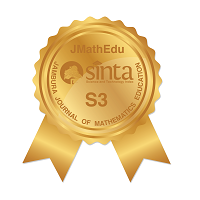Kepraktisan E-Modul Flip Materi Lingkaran Berbasis Problem Based Learning
Abstract
This study aims to test the practicality of the problem-based mathematics e-module based on circle material. The type of research used is comparative descriptive research. The subjects of this study were teachers and students of class IX at SMP Negeri 2 Tilamuta. The results showed that the assessment of using Problem Based Learning -based mathematics e-modules received positive responses from teachers with an average percentage of 87.23% and positive responses from students with an average percentage of 78.45%. The average percentage of teacher and student responses is in the very good category, the module meets the practical criteria. Based on the study result, it can be concluded that the Problem Base Learning -based mathematics e-module, Circle material, fulfils practicality so it is suitable for use in learning.
Keywords
Full Text:
PDFReferences
I. Sriwahyuni, E. Risdianto, and H. Johan, "Pengembangan Bahan Ajar Elektronik Menggunakan Flip Pdf Professional Pada Materi Alat-Alat Optik Di Sma" J. Kumparan Fis., vol. 2, no. 3, pp. 145-152, 2019, doi: 10.33369/jkf.2.3.145-152.
Stephanus Turibius Rahmat, " Pemanfaatan Multimedia Interaktif Berbasis Komputer Dalam Pembelajaran," J. Pendidikan dan Kebudayaan Missio, Vol 7, no. 2, pp. 196-208, 2015.
H. Komikesari, M. Mutoharoh, P. S. Dewi, G. N. Utami, W. Anggraini, and E. F. Himmah, "Development of e-module using flip pdf professional on temperature and heat material" J. Phys. Conf. Ser., vol. 1572, no. 1, 2020, doi: 10.1088/1742-6596/1572/1/012017..
R. N. Prasetyono and R. C. S. Hariyono, "Development of flipbook using web learning to improve logical thinking ability in logic gate" Int. J. Adv. Comput. Sci. Appl., vol. 11, no. 1, pp. 342-348, 2020, doi: 10.14569/ijacsa.2020.0110143.
M. Hidayatulloh, I. Wiryokusumo, and D. Adi Walujo, "Developing Electrical Circuits Flipbook Using Flipbuilder" Int. J. Innov. Educ. Res., vol. 7, no. 2, pp. 124-134, 2019, doi: 10.31686/ijier.vol7.iss2.1331.
R. Seruni, S. Munawaroh, F. Kurniadewi, and M. Nurjayadi, "Implementation of e-module flip PDF professional to improve students' critical thinking skills through problem based learning" J. Phys. Conf. Ser., vol. 1521, no. 4, 2020, doi: 10.1088/1742-6596/1521/4/042085.
E. Watin and R. Kustijono, "Efektivitas Penggunaan e-book dengan flip pdf Professional untuk Melatihkan Keterampilan Proses Sains" Pros. Semin. Nas. Fis., vol. 1, pp. 124-129, 2017.
R. Manalu, E. E. Napitupulu, M. Manullang, D. Simanjuntak, and J. H. Sinambela, "The Difference of Mathematical Problem Solving Ability through the Scientific Approach and the Scientific Approach Assisted by Software Autograph" Am. J. Educ. Res., vol. 6, no. 12, pp. 1693-1701, 2018, doi: 10.12691/education-6-12-16.
F. Al Wadani and A. R. Khan, "Problem-based learning in ophthalmology: A brief review" Oman J. Ophthalmol., vol. 7, no. 1, pp. 1-2, 2014, doi: 10.4103/0974-620X.127908.
E. Ceker and F. Ozdamli, "Features and characteristics of problem based learning" Cypriot J. Educ. Sci., vol. 11, no. 4, pp. 195-202, 2021, doi: 10.18844/cjes.v11i4.1296.
E. H. J. Yew and K. Goh, "Problem-Based Learning: An Overview of its Process and Impact on Learning" Heal. Prof. Educ., vol. 2, no. 2, pp. 75-79, 2016, doi: 10.1016/j.hpe.2016.01.004.
E. M. Yeni, "JUPENDAS , ISSN 2355-3650 , Vol . 2 , No . 2 , September 2015" J. Pendidik. dasar, vol. 2, no. 2, pp. 1-10, 2015.
N. Anditiasari, "Analisis Kesulitan Belajar Abk (Tuna Rungu) Dalam Menyelesaikan Soal Cerita Matematika" Mathline J. Mat. dan Pendidik. Mat., vol. 5, no. 2, pp. 183-194, 2020, doi: 10.31943/mathline.v5i2.162.
Sungkono, "Pengembangan Dan Pemanfaatan Bahan Ajar Modul Dalam Proses Pembelajaran" Maj. Ilm. Pembelajaran, pp. 5-1, 2009.
DOI: https://doi.org/10.37905/jmathedu.v4i2.18204
Refbacks
- There are currently no refbacks.
Copyright (c) 2023 Jambura Journal of Mathematics Education

This work is licensed under a Creative Commons Attribution-NonCommercial 4.0 International License.
Jambura Journal of Mathematics Education has been indexed by:
EDITORIAL OFFICE OF JAMBURA JOURNAL OF MATHEMATICS EDUCATION |
 | Department of Mathematics, Universitas Negeri Gorontalo Jl. Prof. Dr. Ing. B. J. Habibie, Moutong, Tilongkabila, Kabupaten Bone Bolango, Gorontalo 96554, Indonesia |
 | Email: [email protected] |
 | +6285255745923 (Call/SMS/WA) |
 | Jambura Journal of Mathematics Education (JMathEdu | eISSN: 2721-7477) by Department of Mathematics Universitas Negeri Gorontalo is licensed under a Creative Commons Attribution-NonCommercial 4.0 International License. Powered by Public Knowledge Project OJS. |



















